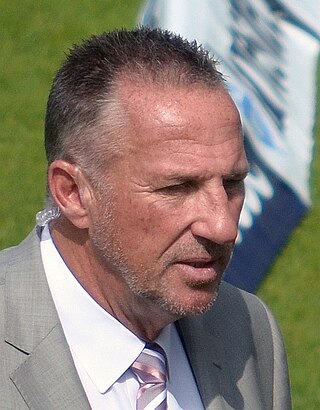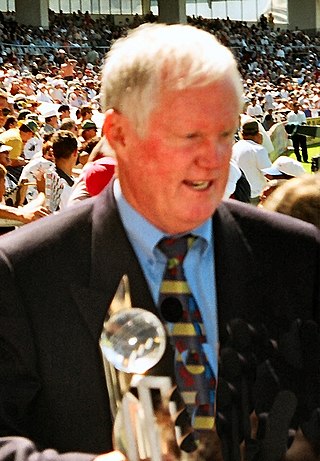Related Research Articles

Ian Terence Botham, Baron Botham, is an English cricket commentator, member of the House of Lords, a former cricketer who has been chairman of Durham County Cricket Club since 2017 and charity fundraiser. Hailed as one of the greatest all-rounders in the history of the game, Botham represented England in both Test and One-Day International cricket.

Andrew Richard Caddick is a former cricketer who played for England as a fast bowler in Tests and ODIs. At 6 ft 5in, Caddick was a successful bowler for England for a decade, taking 13 five-wicket hauls in Test matches. He spent his entire English domestic first-class cricket career at Somerset County Cricket Club, and then played one Minor Counties match for Wiltshire in 2009.

Robert Graeme Pollock is a former cricketer for South Africa, Transvaal and Eastern Province. A member of a famous cricketing family, Pollock is widely regarded as one of South Africa's greatest ever cricketers, and as one of the greatest batsmen in the history of cricket. Despite Pollock's international career being cut short at the age of 26 by the sporting boycott of South Africa, and all but one of his 23 Test matches being against England and Australia, the leading cricket nations of the day, he broke a number of records. His completed career Test match batting average of 60.97 remains the third best behind Sir Don Bradman and Adam Voges.

Lionel Charles Hamilton Palairet was an English amateur cricketer who played for Somerset and Oxford University. A graceful right-handed batsman, he was selected to play Test cricket for England twice in 1902. Contemporaries judged Palairet to have one of the most attractive batting styles of the period. His obituary in The Times described him as "the most beautiful batsman of all time". An unwillingness to tour during the English winter limited Palairet's Test appearances; contemporaries believed he deserved more Test caps.

When the First World War ended in November 1918, thousands of Australian servicemen were in Europe as members of the First Australian Imperial Force (AIF) and many remained until the spring of 1919. In England, a new first-class cricket season was planned, the first since 1914, and an idea that came to fruition was the formation of an Australian touring side made up of servicemen. Agreement was reached with the Australian Corps HQ in London, commanded by Field Marshal William Birdwood, 1st Baron Birdwood, and the Australian Imperial Force Touring XI was formed, initially under the captaincy of pre-war Test player Charlie Kelleway. Kelleway departed after only six matches following a dispute about the fixtures list. A players' meeting elected future Test player Herbie Collins as team captain for the remainder of the tour, despite the fact that Collins' military rank was lance corporal and there were seven officers in the party. The bulk of the team remained intact for nearly nine months from May 1919, playing 33 matches in Great Britain, ten in South Africa on their way home and then another three in Australia itself before disbanding in February 1920. Of the 46 matches, 39 are adjudged first-class and the team had only four defeats, all of these in England. The players lived on their army pay and all profits from gate money went to an AIF Sports Control Board.
Major Arthur North Jewell was an English cricketer who played 29 first-class matches between 1910–11 and 1920, mostly for Worcestershire.
Derek Clifton Morgan was an English cricketer who played for Derbyshire County Cricket Club between 1950 and 1969, captaining the side between 1965 and 1969. An all-rounder, he is the only Derbyshire cricketer besides Leslie Townsend to have achieved the double of 10,000 runs and 1,000 wickets.
Michael Burns is an English first-class list cricket umpire and former first-class cricketer who played county cricket for Warwickshire and Somerset in a first-class career which spanned from 1992 until 2005. He also played Minor Counties cricket for Cumberland and Cornwall. An adaptable cricketer, he appeared for Cumberland and Warwickshire as a wicket-keeper, but when he moved to Somerset he developed into an aggressive batsman who bowled at medium-pace when needed.
Frank Harry was an English cricketer, who played 69 first-class games for Lancashire in the early years of the 20th century, and then another seven for Worcestershire just after the First World War. He also turned out for Durham in the Minor Counties Championship between 1912 and 1914. After his retirement from playing, he stood in 21 games as an umpire, all in 1921.
Keith William Wilkinson is a former English first-class cricketer who played for Worcestershire between 1969 and 1975.
George Herbert Chesterton MBE was an English cricketer who played first-class cricket between 1949 and 1966. The bulk of his appearances were for Worcestershire, whom he represented between 1950 and 1957. He was capped by the county in 1950. Very much a specialist bowler, he never reached 50 in over 100 first-class innings.
George Rodney Cass was an English cricketer: a wicket-keeper who played first-class cricket for Essex and Worcestershire in England, and for Tasmania in Australia, in the 1960s and 1970s. He was capped by Worcestershire in 1970. He was born at Overton, Wakefield, Yorkshire, and educated at Dewsbury Technical College.
John William Elliott was an English cricketer who played ten first-class matches for Worcestershire between 1959 and 1965, although he played for the county's Second XI as late as 1971. He later went on to serve as president for the same club for 2 years and chairman for 8 years. During this time, he oversaw the signing of Glenn McGrath, Andy Bichel, Moeen Ali, Zaheer Khan and Gareth Batty. He made his first-class debut against Somerset aged just 17, though then did not play at that level again for two years.
Steven Joseph "Steve" O'Shaughnessy is a former English professional cricketer who played for Lancashire and Worcestershire in the 1980s, and then had a substantial career in Minor Counties cricket with Cumberland. Since retiring from playing, he has become an umpire, and was promoted in December 2010 to the first-class panel for the 2011 season.
Michael Stephen Anthony McEvoy is an Indian-born former English first-class cricketer who played first-class and List A cricket between 1976 and 1990, with the bulk of his career being between 1980 and 1984.
John Lawrence was a diminutive Yorkshire-born cricketing all-rounder whose middle or lower order batting and leg-break and googly bowling were of great importance to Somerset in the 10 cricket seasons immediately after the Second World War.

Jack David Shantry is a former English cricketer who played county cricket for Worcestershire. He is now an umpire.

Frank Henry Vigar was an English cricketer who played first-class cricket for Essex County Cricket Club between 1938 and 1954. A right-handed batsman, and leg break bowler, Vigar served as an all-rounder with 8,858 runs at 26.28 and 241 wickets at 37.90. From his rained-off debut in 1938, Vigar went on to play 257 matches for his county. His greatest success came in the "golden summer" of 1947, where he scored 1,735 runs and took 64 wickets. A partnership with Peter Smith of 218 for the final wicket remains an Essex record.
Cleveland Vincent Lindo was a Jamaican cricketer. He played first-class cricket in one match for Nottinghamshire in 1960 and in another single match for Somerset in 1963. He was born at Bigwoods, St Elizabeth.
Giles Nicholas Spencer Ridley is a former English cricketer. Ridley was a right-handed batsman who bowled slow left-arm orthodox.
References
- Peter Robinson at CricketArchive (subscription required)
- Peter Robinson at ESPNcricinfo